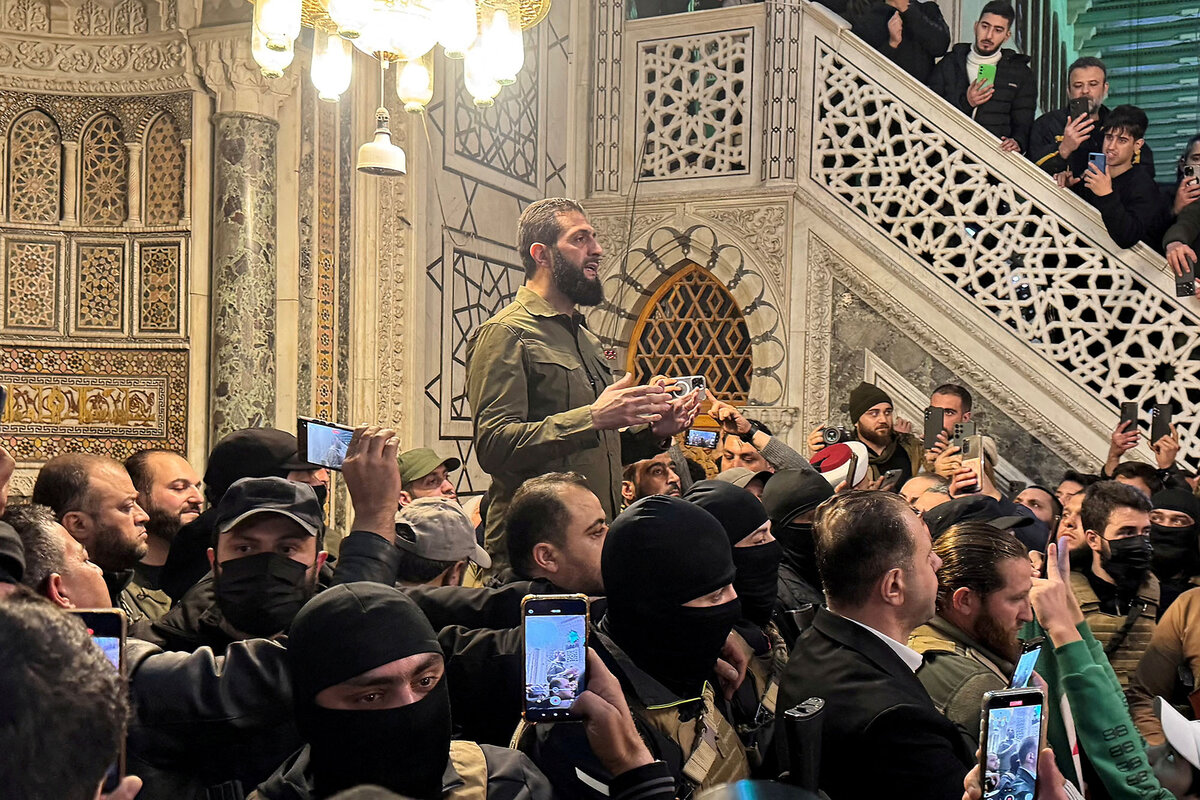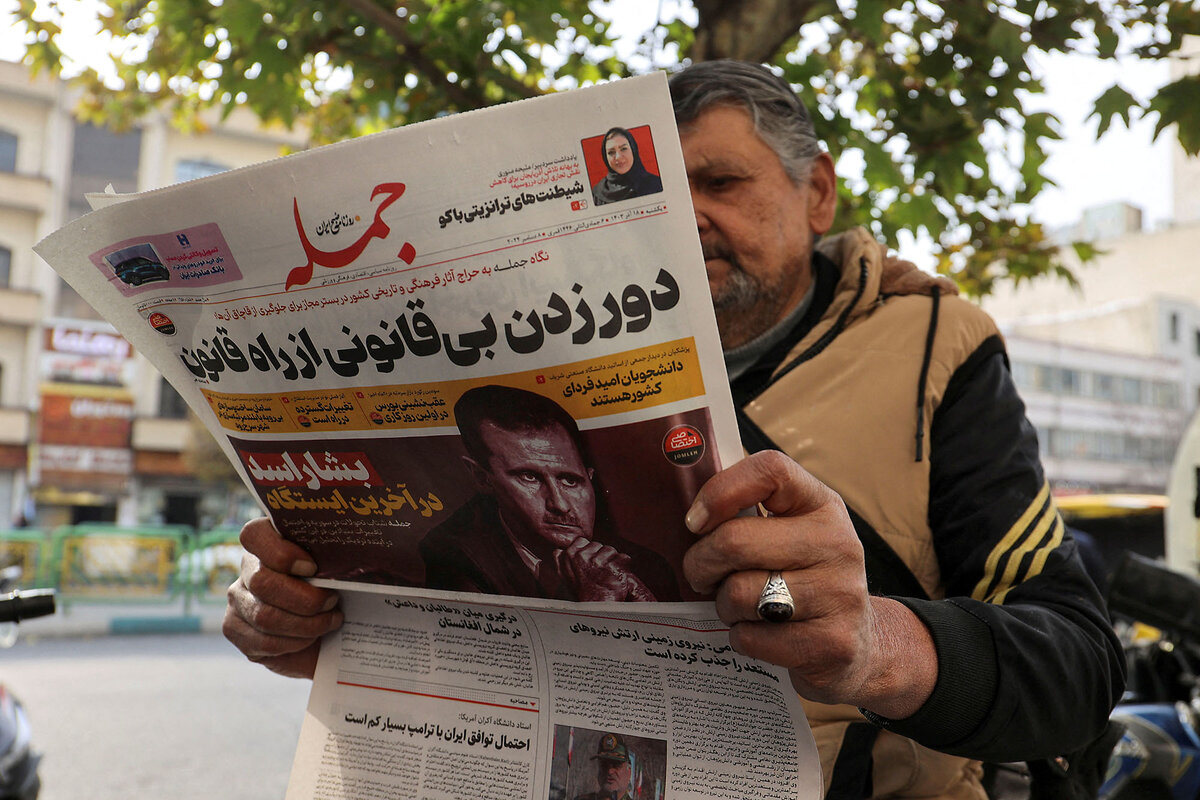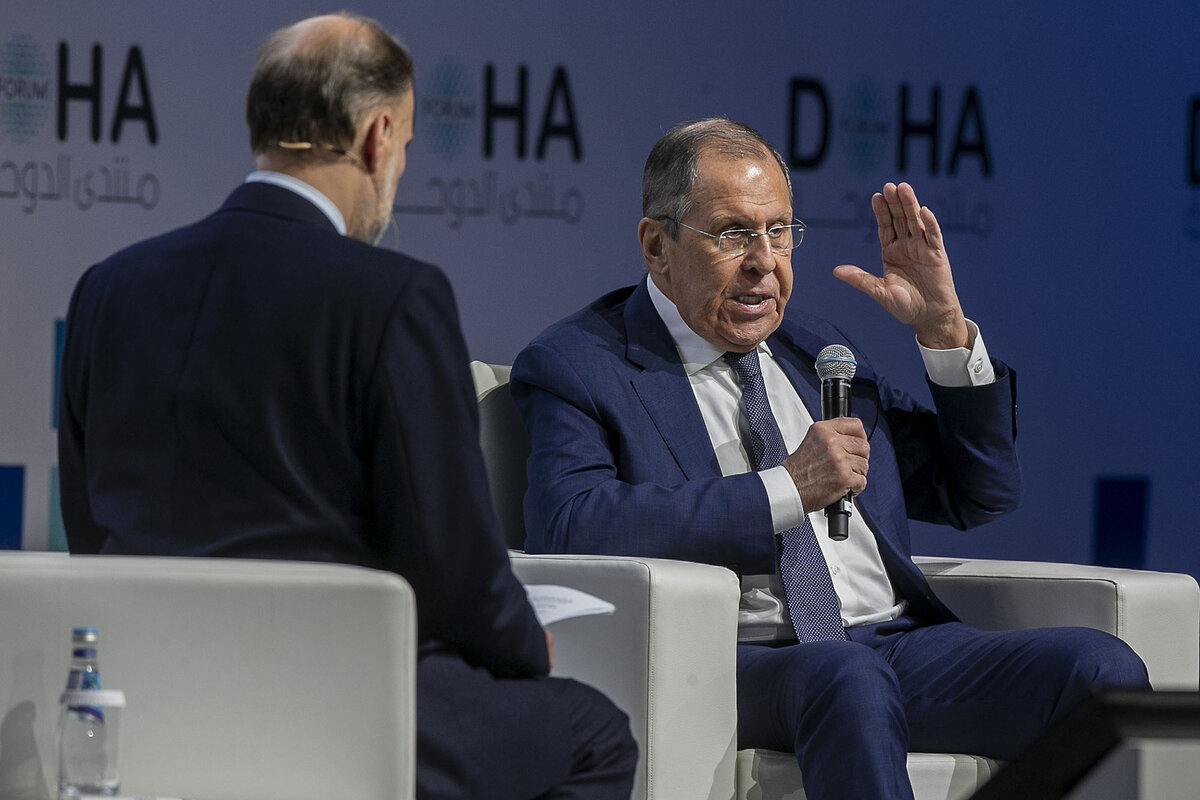What next for leaderless Syria, once the Mideast’s hub?
Loading...
| London
The Middle East’s most enduring reign of terror ended suddenly over the weekend, as Syria’s President Bashar al-Assad scurried out of Damascus and sought haven in Moscow.
While his demise came with breathtaking speed, the repercussions are just beginning – for Syria itself, for the rest of the region, and for major outside players including Moscow, Beijing, and Washington.
That’s not just because Syria’s brutal dictatorship has played a central role in Arab politics for decades; Mr. Assad’s father, Hafez al-Assad, came to power in a coup more than half-a-century ago.
Why We Wrote This
Syria’s civil war, which appeared to be dormant, flared into sudden action last week, toppling a 54-year-old dictatorship in a matter of days. What comes next?
It’s because of the manner in which the younger Assad’s 24-year rule ended.
The uprising that forced him out was the work of homegrown rebel armies, advancing inexorably across the country as his troops scattered and Syrians of all ages and faiths celebrated their success.
Outside powers, both those fueling the country’s civil war over the past 13 years and those trying to end it, were left astonished, unsure of what was happening, powerless to affect events, and grappling for an effective response.
It was the Mideast equivalent of the fall of the Berlin Wall: a turning point long hoped for by many, feared by some, expected by very few, and dizzyingly sudden when it came.
The impact was captured in real time by an extraordinary split-screen moment.
Inside Syria, city after city was falling to rebel forces. Street celebrations were in full flow, with guns being fired into the air and people embracing. “Wahad, wahad, wahad, al-shaab as-Souri Wahad!” some chanted. “One, one, one, the Syrian people are one!”
In the Gulf state of Qatar, 1,300 miles away, elite Middle East leaders and influencers were gathering for their annual Doha Forum, under the banner of “Diplomacy, Dialogue, Diversity.”
In fact, diplomats from major Mideast states and the Russian and Iranian foreign ministers – President Assad’s key supporters – found themselves huddling with one another to figure out what was happening in Syria, how rapidly events were moving, and where they were likely to lead.
By late Saturday, they obviously had found no answers. For even as the rebels were advancing on Damascus, the ministers issued a joint statement stressing “the need to stop military operations” and revive a “comprehensive political process” to negotiate an end to the civil war.
Within hours, Mr. Assad was gone.
And just as when the Berlin Wall came down, while the immediate impact is clear, the implications for the years, or even days, ahead are much more uncertain.
The immediate winners are the Syrian people, freed from a regime that jailed and tortured thousands, barrel-bombed and gassed its own population during the civil war, and enriched itself while the economy crumbled.
The losers, beyond Mr. Assad, are the outside powers that rescued him from defeat nine years ago and used their forces to keep his dictatorship afloat: Vladimir Putin’s Russia and Iran, which provided not just direct aid but troops from its Hezbollah proxy army in Lebanon.
Russia may well now lose the bases it established in Syria – a major air force facility and, even more importantly, its warm-water naval port, in Tartus on the Mediterranean coast. Russian mercenary forces backing military coup leaders in Africa have used Tartus as a critical supply point.
Iran has lost its main supply route to channel arms, equipment, and personnel to Hezbollah.
China, too, could pay a price. Beijing steered clear of military support for Damascus. But it blocked international efforts to negotiate an end to the civil war that would have eased Mr. Assad from power. And last year, Chinese leader Xi Jinping welcomed him to Beijing and announced a “strategic partnership.”
Still, the critical question now is what will happen inside Syria – a country splintered into rival militia strongholds by the civil war, and roughly half of whose 23 million people are now refugees inside its borders or abroad.
The largest of the rebel forces that toppled Mr. Assad – Hayat Tahrir al-Sham – has roots in the Al Qaeda and Islamic State jihadist groups.
Yet its leader, Abu Mohammed al-Jolani, broke with them in 2016. Since the start of the advance on Damascus, he has gone out of his way to insist that a post-Assad government must respect and protect all Syrians of all faiths.
So far, his forces seem to have been as good as his word. HTS’s main regional supporter, neighboring Turkey, seems confident that will continue. It is certainly the hope in the Arab world, and in Washington, as President Joe Biden enters his final weeks in office.
And they will be heartened by initial moves to secure an orderly transition to a new government.
Their concern is that HTS’ bedrock Islamist credo, or simply a rank-and-file urge for revenge against the non-Sunni Muslim, ���Ǵ���, and Druze communities whom the Assad regime courted, might breach Mr. Jolani’s assurances.
There’s also a worry that other groups – including a weakened but still active ISIS – could exploit the political vacuum to try to grab added power and territory for themselves.
Arab political leaders are also aware of the cautionary example of other toppled dictatorships, such as Saddam Hussein’s in Iraq and Muammar Qaddafi’s in Libya. Initial outpourings of popular celebration and unity soon gave way to turf wars and widespread violence.
That may help explain U.S. President-elect Donald Trump’s first public response to President Assad’s fall. “Syria is a mess,” he wrote in a social media post, adding: “THE UNITED STATES SHOULD HAVE NOTHING TO DO WITH IT. THIS IS NOT OUR FIGHT. LET IT PLAY OUT. DO NOT GET INVOLVED!”
Whether he will feel the same way when he returns to the White House in January may depend on how it “plays out” – especially whether ISIS, which he took pride in having helped to defeat during his first term, seems resurgent.
There’s a saying among Mideast-based foreign correspondents, used to sum up a sobering lesson that many outside powers have learned about the economic, strategic, and security importance of this often frustratingly unstable region.
“Just because you say you’re through with the Mideast, that doesn’t mean the Mideast is through with you.”











